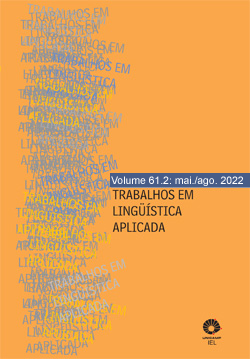Abstract
In this article, I discuss a teaching experience of the interview genre in Portuguese classes for indigenous students in an undergraduate course. The text reflects on how the classes were planned and developed based on intercultural dialogue between the linguistic and cultural knowledge that has historically framed the genre in question, and the knowledge of the indigenous teachers, who are beginning to use the interview as a methodological resource for their research, conducted with members of their communities. The question and answer model of the interview and the presumably quick timing of the answers were problematized by the students since it was not a format evaluated as possible to be used by indigenous researchers with elders of their peoples. According to the students, the genre may violate interactional rules and principles of indigenous knowledge. The article aimed to highlight the need for oral tradition to be considered in academic knowledge production and Portuguese language teaching for indigenous people.
References
BARRETO, João Paulo Lima (2013). Wai-mahsã: peixes e humanos. Um ensaio de Antropologia Indígena. Dissertação de Mestrado em Antropologia Social. Instituto de Filosofia e Ciências Humanas, UFAM, Manaus.
BENITES, Sandra. (2020). Educação Guarani e interculturalidade: a(s) História(s) Nhandeva e o teko. Caracol. n.20, jul-dez., p. 188-200.
CARDOSO GAVIÃO, Leonice (2016). Pỳrpex jõ´amjõhquẽn. Festa da tora da barriguda. Revista Articulando e Construindo Saberes. v.1, n.1, p. 267-278.
CAVALCANTI, Marilda C. (2006) Um olhar metateórico e metametodológico em pesquisa em linguística aplicada. In: Moita Lopes, Luiz Paulo (org.) (2006) Por uma linguística aplicada indisciplinar. São Paulo: Parábola.
CAVALCANTI, Marilda C. (2013). Educação linguística na formação de professores de línguas: intercompreensão e práticas translíngues. In: Moita Lopes, Luiz Paulo. (org.). Linguística Aplicada na Modernidade Recente - Festschrift para Antonieta Celani. 1ª. ed. São Paulo: Parábola.
CAVALCANTI, Marilda C. (2015). Línguas ilegítimas em uma visão ampliada de educação linguística. In: ZILLES, Ana Maria S.; FARACO, Carlos Alberto. (orgs.) Pedagogia da variação linguística. Língua, diversidade e ensino. São Paulo: Parábola.
HABUDJA KARAJÁ (2018). Reflexões de práticas pedagógicas no Estágio. In: HERBETTA, Alexandre (org.) Novas práticas pedagógicas. Considerações sobre transformações escolares a partir da atuação de docentes indígenas do Núcleo Takinahakỹ. Goiânia: Gráfica UFG. p.31-74.
KAOREWYGOO TAPIRAPÉ (2018). Iny ijyy-my. Revista Articulando e Construindo Saberes. v.3, n.1, p. 220-229.
KRENAK, Ailton (2019) Ideias para adiar o fim do mundo. São Paulo: Companhia das Letras.
LAHIRI KARAJÁ, Uziel (2016). Wetxu. Revista Articulando e Construindo Saberes. v.1, n.1, p. 125-128.
MAKONI, Sinfree; PENNYCOOK, Alastair (2007). Disinventing and reconstituting languages. Bilingual Education and Bilingualism, 62.
MIGNOLO, W. (2003). Histórias locais/projetos globais. Colonialidade, saberes subalternos e pensamento liminar. Belo Horizonte: Editora da UFMG.
MOITA LOPES, Luiz Paulo (2013). Ideologia linguística: como construir discursivamente o português do século XXI. In: MOITA LOPES, Luiz Paulo (org.) O português no século XXI. Cenário geopolítico e sociolinguístico. São Paulo: Parábola, p.18-52.
MOITA LOPES, Luiz Paulo (org.) (2006). Por uma linguística aplicada indisciplinar. São Paulo: Parábola.
MUNDURUKU, Daniel (2012). O caráter educativo do movimento indígena brasileiro (1970-1990). São Paulo: Paulinas.
OLIVEIRA, Joana C.; SANTOS, Lucas K. dos (2016). “Perguntas demais” – Multiplicidade de modos de conhecer em uma experiência de formação de pesquisadores Guarani Mbya. In: CUNHA, Manuela C. da; CESARINO, Pedro de N. (orgs.) Políticas culturais e povos indígenas. São Paulo: Editora Unesp.
PAXRE APINAJÉ, Maria dos Reis (2018). Histórias Apinajé: formas de contar, registrar e conhecer o mundo. In: HERBETTA, Alexandre. (org.) Novas práticas pedagógicas. Considerações sobre transformações escolares a partir da atuação de docentes indígenas do Núcleo Takinahakỹ. Goiânia: Gráfica UFG. p.93-102.
PENNYCOOK, Alastair (2006). Uma linguística aplicada transgressiva. In MOITA LOPES, L.P (org.) Por uma linguística aplicada indisciplinar. São Paulo: Parábola.
PIMENTEL DA SILVA, Maria do Socorro (2017). A pedagogia da retomada: decolonização de saberes. Revista Articulando e Construindo Saberes. v.2, n.1, p. 203-215.
RAMPTON, Ben (1995). Language crossing and the problematization of ethnicity and socialization. Pragmatics.5:4, p. 485-513.
RAMPTON, Ben (2006). Continuidade e mudança nas visões de sociedade em Linguística Aplicada. In: MOITA LOPES, Luiz Paulo (org.) (2006) Por uma linguística aplicada indisciplinar. São Paulo: Parábola.
ROCHA, Décio; DAHER, Maria Del Carmem; SANT´ANA, Vera Lúcia de A. (2004). A entrevista em situação de pesquisa acadêmica: reflexões numa perspectiva discursiva. Polifonia. v. 8, n.8.
SIGNORINI, Inês; CAVALCANTI, Marilda C. (orgs.). (1998). Lingüística Aplicada e Transdisciplinaridade: Questões e Perspectivas. Campinas: Mercado de Letras.
SIRNÃWẼ, Silvino (2015). Roça tradicional do povo Akwẽ-Xerente. In: PIMENTEL DA SILVA, Maria do Socorro; BORGES, Mônica V. (orgs.) Práticas pedagógicas de docentes indígenas. Goiânia: Gráfica da UFG, 2015, p. 217-232.
SMITH, Linda Tuhiwai (2018). Descolonizando metodologias: pesquisa e povos indígenas. Trad. Roberto G. Barbosa. Curitiba: Ed. UFPR.
TEIJOLORI KARAJÁ (2018). Iny-ki ijasò riòrarunyre-my ijyy. Revista Articulando e Construindo Saberes. v.3, n.1, p. 14-33.
URIAWA KARAJÁ, José (2016). Ciclo da vida Iny. Revista Articulando e Construindo Saberes. v.1, n.1, p. 129-132.
WALSH, Catherine (2009). Interculturalidade crítica e pedagogia decolonial: in-surgir, re-existir e re-viver. In CANDAU, V.M. (org.) Educação intercultural na América Latina: entre concepções, tensões e propostas. Rio de Janeiro: 7 Letras.

This work is licensed under a Creative Commons Attribution 4.0 International License.
Copyright (c) 2022 Trabalhos em Linguística Aplicada


